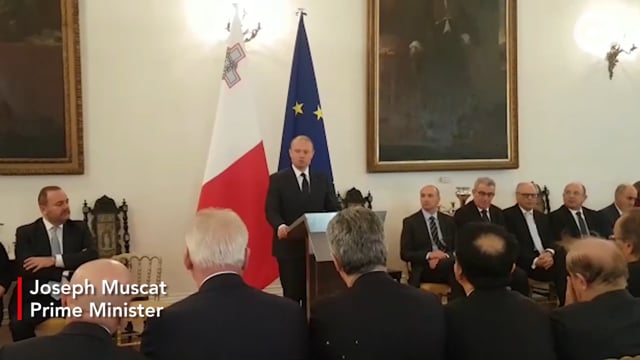[WATCH] Migrant stand-off exposes EU states’ lack of understanding, Muscat tells diplomats
Joseph Muscat said there are serious weaknesses in the governance of the migration phenomenon, as the recent Sea Watch impasse had shown


Prime Minister Joseph Muscat told diplomats at the New Year’s greetings that a migrant rescue stand-off that developed over the past three weeks had shown the lack of understanding that exists among European Union member states.
Muscat insisted that the Sea Watch rescue vessels had saved migrants at sea within the Libyan search and rescue area, but had sailed to Malta instead of the nearest safe port. “[This] exposes serious weaknesses in the governance of this phenomenon and a lack of understanding by a number of European countries of what is happening at the southernmost part of Europe.”
The NGO Sea Watch has refused to take migrants fleeing Libya, which is still at the centre of a protracted civil conflict, back to the place of departure – a move that would break the international rule of non-refoulement.
“Stability in the region also means a longer-term solution for migration,” Muscat highlighted.
While he thanked the eight countries which had accepted to take a number of migrants relocated from the rescues, he said that the ad hoc solution “was by no means final”.
“Immigration will remain an issue for Europe in the weeks, months and years to come. Ignoring it will be to the detriment of the future of the EU as a union,” he underlined.
He added that Malta supported the Global Compact on Migration because there was a need for a global dimension which goes beyond the EU border. “A global approach can safely assist in managing migration, and here Africa remains Europe’s most important partner.”
Stable Libya important for the region
Muscat also highlighted stability in Libya as being important not only for all Libyan people who have a special relationship with Malta, but also for stability in the region.
He said Wednesday’s visit by Libyan Prime Minister Serraj was not only a continuation of a dialogue between two neighbouring countries but also a way to keep in touch with friends who are passing through a period of upheaval.
Noting that Libya can be a “major international player with so much resources that can turn it into an economic powerhouse”, he said Malta would continue to work with its regional and international partners towards ensuring Libya’s complete sovereignty over its natural resources.






.jpg)












.jpeg)



